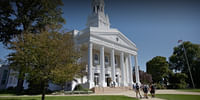Food poisoning outbreaks, strains of antibiotic-resistant bacteria, and the rise of infectious diseases including AIDS and TB have brought new awareness and the realization that public health is not just a concern of Third World countries. These and other topics including environmental factors that influence health, vaccine schedules, and how antibiotics work will be covered. Lectures, discussion, and student group projects. Three hours per week.
Nutrition and the Human Body
American culture is obsessed with food, but what do we really know about food? This course will explore multiple biological aspects of food. The course will begin with basic nutrition and then study diets, vitamins, and other supplements to determine if they really work. The biological, genetic, and environmental aspects of disorders such as obesity, anorexia, diabetes, heart disease, and cancer will be examined. The safety of food has become a greater concern in society due to genetic engineering, irradiation of food, use of pesticides, and food-borne illness such as 'mad cow' and E. coli. These risks will be studied. The course will conclude with an exploration of the effects of meat- or grain-based diets on the environment.
Adaptive Patterns Animal Behavior
The world's diverse animal species display a fascinating variety of behaviors that sometimes seem to defy explanation. Students will learn to apply evolutionary principles and scientific inquiry to solving the puzzles of animal behavior. Using videos, popular articles, and scientific research papers, we will examine how the scientific process of posing questions, proposing hypotheses, and testing predictions leads us to understand the behavior of many species including our own. Lectures, discussion, student presentations and projects. Three hours per week.
Learning About the Living World
This course will examine selected topics in life science and earth science such as the human body and its functioning, ecology, ecosystems, weather, the water cycle, and erosion. Designed primarily to provide elementary education majors with the necessary background for teaching in K-8 schools, the course is appropriate for other students interested in strengthening their knowledge and confidence in investigating fundamental concepts and ideas in science. Students will participate in lectures, discussion, student presentations and projects, and laboratory activities.










.png?tr=h-40,w-40,c-force)



